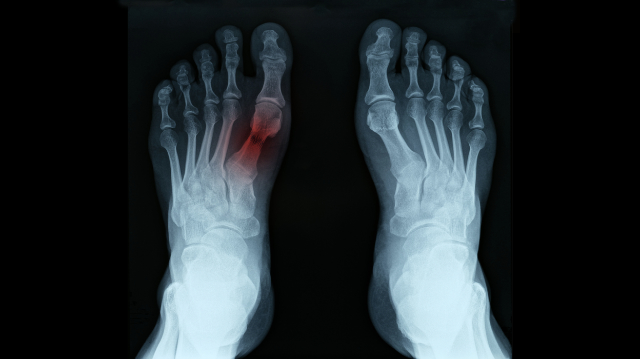
Introduction to Stress Fractures
Stress fractures in the foot are a common yet often overlooked injury that can significantly impact your daily activities and sports performance. These injuries occur due to repeated stress on the foot bones, particularly when such activities increase suddenly without adequate time for the bones to adapt.
What Causes Stress Fractures?
The primary cause of stress fractures is the application of repetitive force on the foot, often seen in athletes, military personnel, and individuals who suddenly engage in high–impact activities like running or jumping. Key risk factors include an increase in activity intensity, frequency, or duration without proper conditioning, inadequate footwear, and poor training techniques. Specific populations, such as women and those with underlying bone density issues, are at higher risk due to physiological and anatomical factors.
High–Risk vs. Low–Risk Fractures
- Low–Risk Fractures: These typically occur in bones that can bear weight more effectively and have a good blood supply, making them less prone to complications. Examples include fractures in the calcaneus (heel bone) and are often treated with rest and activity modification.
- High–Risk Fractures: These occur in areas with poor blood supply or that bear a lot of stress, like the navicular bone in the midfoot. These fractures require more aggressive treatment, possibly including surgery, due to a higher risk of complications like non–union.
Symptoms and Diagnosis
Stress fractures manifest as a vague, aching pain that intensifies with activity and diminishes with rest. Early on, they might not be visible on X–rays, making them difficult to diagnose. Advanced imaging techniques such as MRI or CT scans are often necessary to confirm a stress fracture.
Treatment Strategies
The treatment of stress fractures largely depends on their location and severity. Low–risk fractures might only need rest and physical therapy, while high–risk fractures could require surgical intervention. Key treatment approaches include:
- Activity Modification: Avoiding high–impact activities to allow healing.
- Protective Footwear: Using supportive shoes or boots can help reduce stress on the foot.
- Physical Therapy: Strengthening surrounding muscles and improving bone health through targeted exercises.
- Surgery: In cases where fractures don't heal with conservative treatment, surgical options like pinning or screw fixation might be necessary.
Preventive Measures
Prevention is crucial for stress fractures. Gradually increasing the intensity of new activities, wearing appropriate footwear, and incorporating strength training to improve muscle support around the bones can help prevent these injuries.
Conclusion
Stress fractures can be a major setback, but with proper diagnosis, treatment, and preventive strategies, most individuals can return to their normal activities without lasting issues. Awareness and early intervention are key to managing this silent strain effectively.
Call to Action
Are you experiencing persistent foot pain during activities? It might be a stress fracture. Contact us today for more information and get a personalized assessment and treatment plan tailored to your needs. We're here to help you step back into action with confidence and strength!
For further details on stress fracture management, see the latest research here.


